- Home
- Marge Piercy
City of Darkness, City of Light Page 2
City of Darkness, City of Light Read online
Page 2
People in Pamiers had long memories and a suspicion of Paris and the north and the French kings handed down from father to son and mother to daughter like a family heirloom. People still spat when they mentioned the name Simon de Montfort, and his name was not infrequently mentioned for a lord who had been dead five hundred years. He was the model of evil coming down on them from above and from away, from the north. They had had their own religion, their own culture, their own language down here. They had been a prosperous and cultured people, with as many ties to the Moors and to Italy as to the sword-rattling rosary-telling north.
Pope Innocent had declared a crusade against them. The fierce armies of the Capetian kings of Paris set fire to the country and slaughtered the people and burned alive their leaders, their saints, their prefects. The anger of the people had been forced underground, but every couple of hundred years, it erupted, hot and molten. A little less than two hundred years before Claire was born, militant Protestants attacked the churches, smashing icons. The royal Prince de Condé sacked the town then, burning, turning loose the casual slaughter of his troops. This history blew in the dust of the streets, in the old marks of fire on buildings, but she had Grandmère to tell her the tales as they minded the boiling cauldrons. Grandmère taught Claire all she knew about who she was and why.
Anger and rebellion were in her blood. She was born to it, as she was born to the dark hair and the sturdy bones and muscles of her people. She was strong in the back and shoulders. Her bust developed early. Men began looking at her. They began to try to touch her, to pull at her when she went by. She punched them. She cursed at them. She knew what happened if they got their hands on her. Her oldest brother had to marry his girlfriend after the men held a charivari under her window to shame her. Her second brother had been a smuggler, and from one trip, he never returned. Pierre was the only boy at home, and she hated him. He was always pinching her. They had a few chickens in the yard and an orange tabby she loved called Rougie. One day he had been teasing Rougie, who had scratched him, so Pierre threw Rougie in the boiling cauldron. He died, screaming as he cooked alive although Claire had burned her arm trying to fish him out. She hated Pierre and he hated her. He called her Big Mouth. He said she would die in a ditch with her throat cut. No man wanted a woman with a loud mouth. Fine, she did not want to be wanted.
She always paid attention to travelers, organ grinders, fiddlers, conjurors, displayers of relics, storytellers, peddlers with marmots or ferrets who performed or caught rats. That summer of her fifteenth year, a troop of actors arrived. Town people spit at them and made the sign of the evil eye, as they did when the Jews came through selling horses, but almost everyone went to the performances. Jews were horse tamers and traders, sometimes peddlers; actors were outside the law too. They could not be married in the Church. All Protestants were considered illegitimate, as were all Jews. And all actors. None could be buried in regular cemeteries.
But she thought them splendid, dressed in shining clothes and reciting fine speeches. There were seven of them, all dressed as kings and queens and great lords and ladies. The women got to talk as much as the men. One woman, who was a Greek queen, was the center of the play. Claire had a little money she had saved, and she took from her precious hoard so that she could go to every performance. Then she came home and told Grandmère how the queen spoke and everyone listened. She was fascinated by the woman who played the queen. There was one younger woman too, but she did not have as loud a voice. She could not decide which of the two important men was the most imposing. One was taller, but the other strode about like a real king must. He made the air ring. He had red hair. She had never seen a man with red hair. He was handsome and exotic and when he spoke, his voice was like perfume, like incense and oil.
She thought them the luckiest people she had ever seen. They went from town to town. If they didn’t like Pamiers or Pamiers didn’t like them, the next day they would be in Foix or Toulouse. They spoke words that filled her mind. Words that shone and sparkled and shook out like the richest velvet. She wanted to come close to them. She wanted to become them. They made people laugh and cry. Everyone shut up and listened. That was glory. She had a big loud voice. She could do it too. Then there would be power instead of shame in being Big Mouth.
Claire did not want to live like her mother. She did not want to be a laundress. She did not want to kneel soaking wet in the cold and the raw weather scrubbing bloody sheets until her knuckles were red and swollen. She did not want to go hungry with too many children to fill up with bread. She did not want to give birth to five loud screaming hungry children and two who failed and a stillbirth. Nor did she crave the attentions of the men in the square who called to her as if she were a dog, or the monk pressing against her at the market, or the men who tried to pull her inside when she delivered the laundry. She was tired of the dusty streets of Pamiers where the icy wind blew down from the Pyrénées in the winter and the hot wind scorched them in the summer, where the Ariège rose out of its banks to drown them and mosquitoes swarmed and the young and the old sickened and died.
The troupe had her mother wash their shirts and chemises. Claire brought them to the inn. The actors were to give one more performance and then move on toward Toulouse. She spoke to the woman who had played the queen.
“How do you get to be an actress, madame, please.” She spoke carefully, like her father, keeping the heavy southern accent out of her speech. She had always known both ways of speaking, like her father or like her mother.
“You have to have a natural talent, child,” the woman said loftily. On stage she had looked imposing. Now Claire could see she was middle-aged and stout. “You have to be able to read your lines or get them by rote.”
The red-headed man leaned forward. “A fine-looking girl. How old are you?”
She was fifteen, but she decided to be older. “Eighteen, sir.”
“So you want to be an actress? Instead of a laundress?” He laughed, but he did not seem cruel. He seemed to feel anyone would want that.
“Yes, sir, but I’d do your laundry too if you took me along. And I do know how to read.” Grandmère had taught her. As a Protestant, Grandmère believed in Bible reading.
“Child, we don’t need a laundress. Every town has its own.”
“She’s a beauty, isn’t she, Jean-Paul? Flashing dark eyes, the carriage of a princess. But what about the family? All we need is to get charged with abduction.”
“These poor families, they’d just as soon be rid of a girl,” the older lady said. “They probably haven’t the money for a dowry.”
“I’ll ask my mother. My father’s dead,” Claire said. “Where do you go next?” She memorized their route. If they would have her, she would go with them. She would let them leave, and then she would run away after them. She would not say a word to her mother, for Maman would never let her go. Maman would chain her to the cauldrons. No, she was going to wear fine costumes and speak words that rippled on the air like banners and travel all the roads of the country. That was living. That was being a free woman.
She told no one but Grandmère. Grandmère had been to Toulouse three times and told her how to go. Once she was far away she would write Maman. They would consider her a fallen woman, but if she sent money, they would not really mind. She would see the world, as her father had. Goodbye to the laundry pots, to the dusty streets, to Pierre and his friends, adieu.
TWO
Max
(1766–1775)
MAX liked to watch his flock peck grain. Holding a dove gave him softness and warmth, comforting, reliable. He tried never to think of his mother, since the day she had screamed and screamed upstairs and then did not scream any longer. That had been the fifth child. It had survived her three days. Nothing had ever been the same again; nothing had ever been right. His mother had adored him. She had called him her prince. He was gentle with his doves. This was Doucette. He said her name softly as she cooed in his hand. He could not bear to think of the
m going hungry, being attacked by a dog or cat, carried off by a hawk. He would protect them. They would not leave him.
It was harder to take care of his sisters, Charlotte and Henriette. After their father had run away, the orphans (for it was given out that the father was dead) were split up. He and his little brother Augustin were taken in by his mother’s family, the Carrauts, local brewers. His father had come down in the world to marry his mother, everyone said, and they called Max a bastard. They mocked him because he had been born four months after the wedding. His father’s sisters took Charlotte and Henriette, and they only got to spend Sundays together. His father had been a lawyer who, Grandpère Carraut said with contempt, entertained ambitions of entering the nobility of the robe—judges, lawyers considered less grand than the nobility of the sword, but they paid no taxes and had lots of privileges. Father had begun to style himself “de Robespierre,” which meant he was making some kind of claim. Max thought perhaps the Robespierres needed all the help they could muster.
He was the oldest. He was in place of the father, pater familias. He was learning Latin at school, at the huge grim building of the Abbey of Saint Vaast, where it was always cold. It was grey and attached to the Cathedral. In front were enormous daunting steps, but the boys went in the side. He would gather them together someday, his two sisters and his little brother, and they would live in a house with a yard. His doves would have a beautiful cote like the one he had seen at the Canon’s when he was summoned there because of his excellent grades and his essay on virtue.
He did not understand why it was considered a reward being kept standing and standing while the Canon was occupied and then given a speech about being extra virtuous because of his dubious background: dubious? He had stood there with his eyes on the Canon unblinking, and flung his words back in his face, silently. Dubious in what way, sir? Don’t you believe my father was my begetter? Are you doubtful I was born? Perhaps I was found under a cabbage leaf, as they tell children who have not heard the dreadful cries of childbirth and smelled and seen the blood. In their eyes, he was only a child. At ten years, he considered himself almost adult. Someday he would speak and they would hear him, whether they liked it or not. Ever since his mother died, he had lived under a heavy lid that weighed on him day and night, all week but Sunday when after mass they were all briefly together.
The Canon asked him if he felt he might have a vocation for the Church. “You must make your way in the world,” the Canon said to him. “The military will not do. You’re a small boy, and you’ll be a small man. And you must have noble quartering for four generations to be an officer. There are the courts, but you’re a quiet retiring sort. The Church is your way, my son.”
“But I thought you had to be noble to be a bishop.”
The Canon frowned. “There are other posts in the Church. A bright young man can make his way. You might be content in a monastery—after all, you’re a studious lad.”
Max promised that he would consider seriously what the Canon said, but he had his siblings to take care of. He did not want to be a monk. He would be a lawyer like his father but one who made a name and enough money.
When he came home, his grandfather told him at supper that he was very lucky that the Canon was taking an interest. He must strive to be worthy of the Canon, who made recommendations to the absent Bishop, who controlled scholarships. If the Canon remained interested in him (what a phrase, Max thought, as if he were a story), then his future was made. He could go to a good school.
He confided in no one; his sisters were too flighty; Augustin, whom everyone called Bonbon, too young. Until Max had shown a talent for schooling, Grandpère meant to put him in the brewery. The smell of beer made Max gag. He drank watered wine in the season when there was no milk. His stomach was delicate. Sometimes the smell of meat made him sick. It reminded him of blood. His grandmother gave him warm milk with a little coffee in it for breakfast and bread spread with jam from wild strawberries. Soon it would be Christmas and there would be oranges. Nothing smelled as good as oranges.
Every Sunday he let his sisters hold the doves, so long as they were careful. “Max,” Charlotte said, “tell us the way it’s going to be, when you finish school.” Charlotte and Henriette settled down, each with a dove held gently in their hands, as he had shown them. Bonbon was too young. He was playing in the sand with a toy dog that had been Max’s. Bonbon was used to playing alone while Max was at school. They did not fit into the rigid levels and boxes of the town. They were better than peasants, who were far down below, better than artisans who worked making shoes or metal work, better than shopkeepers or the keeper of the inn. But they were less than the children of successful lawyers, less than the illegitimate son of the Canon.
“We’re going to live together in a big stone house—”
“Last week you said red brick,” Charlotte corrected him primly.
“This week it’s stone. Stone is better.”
“Red brick,” said Charlotte. “You promised us red.”
“Stone is better,” Max said firmly. “It’s more … elegant.” It was a new word he had learned, and he had to explain to his sisters. Many of the older houses in the town were brick, with stepped facades on the roofs, so a giant could climb them, he imagined. But the houses of the rich were made of stone. “We will each have our own room. We’ll have fruit trees in a glass-walled orangerie, like the abbé does, so we can have fruit even in winter.”
“And who will we have to live with us?” Henriette asked. This was her favorite part. She was the second-youngest.
“We’ll have each our own dog. They’ll be very well trained dogs and never, never hurt our doves, who’ll live in a cote attached to my room so I can always see and hear them and make sure they’re safe. Every day we’ll go out in the fields with our dogs and run with them, as far as we want.”
“I want a spaniel,” Charlotte said.
“I want a cat,” Henriette insisted. “I want a tabby cat.”
“Max, give us one of your birds. You have so many, and we don’t have any. We have nothing of our own. In our aunts’ house we’re not allowed to touch anything. Just one dove for us. They’re so pretty, Max, please!”
Every week they begged him and he refused them. Afterward he felt guilty. He felt guilty because he could not yet keep the family together. He had to grow up first, but it was taking too long. He felt guilty because things were not as they should be. He was the real cause of his parents’ marriage. His sisters were unhappy, and that too was his fault. If only he could just grow up right now and do what he had to.
“All right,” he said slowly. “I’ll give you Blanchette. But you must treat her well.” For the next ten minutes he explained to his sisters how they must take care of Blanchette. But when they left after supper for their aunts’ house, he felt sick with apprehension. Blanchette looked forlorn in her cage, taken away from her own family, the other doves. He had condemned her to exile, as his sisters were exiled from him and Augustin.
For two weeks, Charlotte and Henriette took care of Blanchette properly. But during the third week, a storm came up in the evening, high winds, fierce cold, the north wind blowing down from the Austrian Netherlands. The girls in their beds forgot Blanchette. In the morning she was dead.
Max wept. His grandfather rebuked him. It was not manly for a boy of ten to cry over a bird. Max wept to himself after that, without sound. He could not finally blame his sisters, for they were young. And they were girls. Girls and women were weak. They took ill. They were seduced and had babies too soon. They died. Things entrusted to them died too. It was his fault. He must take better care. He must keep control. Max was the only father his family had: he who would become Maximilien de Robespierre, attorney in the Bishop’s court, judge, perhaps mayor of Arras. He would save his family and hold them together.
Max’s sisters, Charlotte and Henriette, were shoveled off to a charity school, to be taught to sew, embroider, pray and keep their place humbly. He h
imself, age eleven and always counting, got on the coach to Paris, bound for the school Louis-le-Grand, across the street from the Sorbonne. The Canon had recommended him to the powerful and absent Bishop of Arras who controlled four scholarships. One had gone to Max.
Louis-le-Grand was popular among the aristocracy. The wealthy boys lived in comfortable rooms, with their servants and valets nearby. Max was put into a dormitory with a temperature little above that of the narrow cobbled street outside. The middle-class children permitted into Louis-le-Grand were given a good education but little food and no comfort. Discipline was strict and painful, but Max had no trouble managing within the rules. Not that he obeyed every law. By the time he had been at school four years, he was reading clandestine books: not the pornography the boys passed around, but the books of forbidden philosophers. They went to church twice daily. Behind his missal he read Rousseau. He existed imaginatively in Roman history, in Rousseau’s life.
He was small and narrow-chested with no interest in sports. He liked to walk, but they were only permitted to leave the precincts of the college on Sunday, the dark vaulted halls, the gloomy corridors that smelled of drains, the bleak crowded dormitory, the shadowed courtyard. He began to understand who the Bishop of Arras was: a great man, a courtier. He was received at Versailles. He was handsome and ambitious. Max had no love for his benefactor the Canon, who had never treated him other than as one might have a kind thought for a spaniel seen from a coach window; but to stay on good terms with both was important. Max won annual prizes in the school and in citywide contests. At night he dreamed of a stone house with his sisters, his little brother, doves and a dog. He dreamed of refounding his broken family. He would become a great man like his hero Jean-Jacques Rousseau, always persecuted but always virtuous, disdaining nobles and kings. Someday he would meet his hero face to face. Jean-Jacques would touch him lightly on the shoulder. “You are a true disciple.”

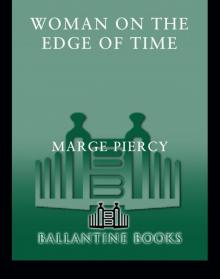 Woman on the Edge of Time
Woman on the Edge of Time The Cost of Lunch, Etc.: Short Stories
The Cost of Lunch, Etc.: Short Stories Made in Detroit: Poems
Made in Detroit: Poems Sleeping With Cats
Sleeping With Cats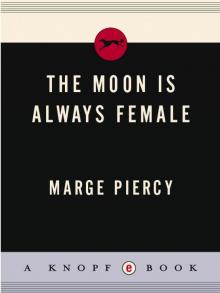 Moon Is Always Female
Moon Is Always Female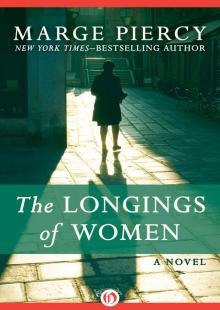 The Longings of Women
The Longings of Women Circles on the Water
Circles on the Water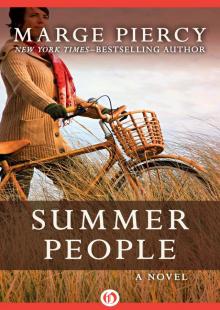 Summer People
Summer People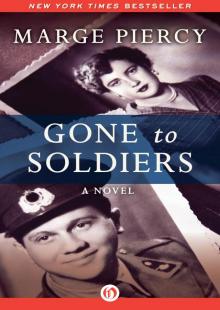 Gone to Soldiers: A Novel
Gone to Soldiers: A Novel The Hunger Moon: New and Selected Poems, 1980-2010
The Hunger Moon: New and Selected Poems, 1980-2010 Vida
Vida Fly Away Home
Fly Away Home He, She and It
He, She and It So You Want to Write
So You Want to Write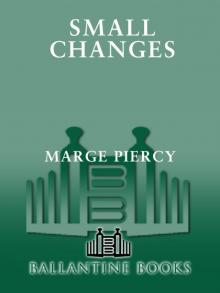 Small Changes
Small Changes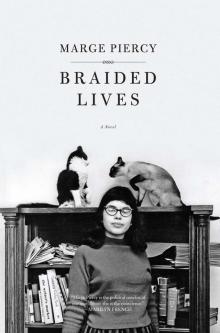 Braided Lives
Braided Lives Lord Valentine's Castle
Lord Valentine's Castle Dance the Eagle to Sleep
Dance the Eagle to Sleep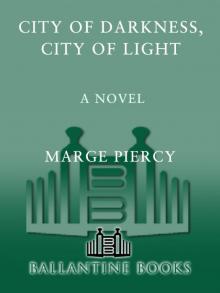 City of Darkness, City of Light
City of Darkness, City of Light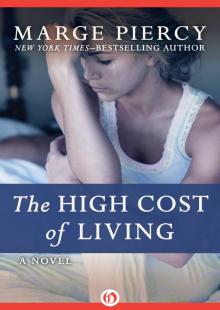 The High Cost of Living: A Novel
The High Cost of Living: A Novel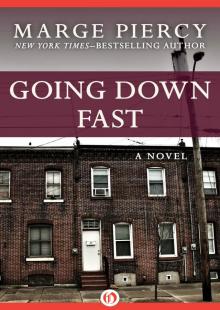 Going Down Fast: A Novel
Going Down Fast: A Novel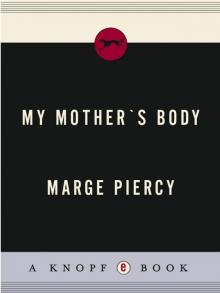 My Mother's Body
My Mother's Body Storm Tide
Storm Tide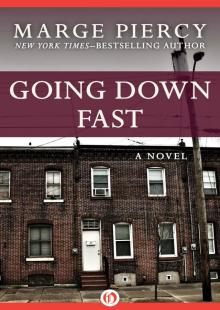 Going Down Fast
Going Down Fast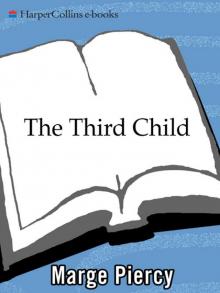 The Third Child
The Third Child The Hunger Moon
The Hunger Moon The Cost of Lunch, Etc.
The Cost of Lunch, Etc. Sex Wars
Sex Wars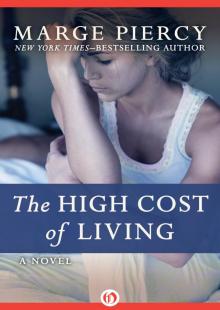 The High Cost of Living
The High Cost of Living Made in Detroit
Made in Detroit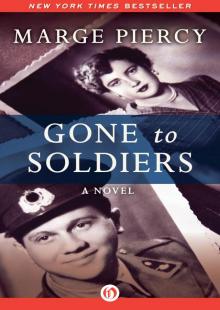 Gone to Soldiers
Gone to Soldiers